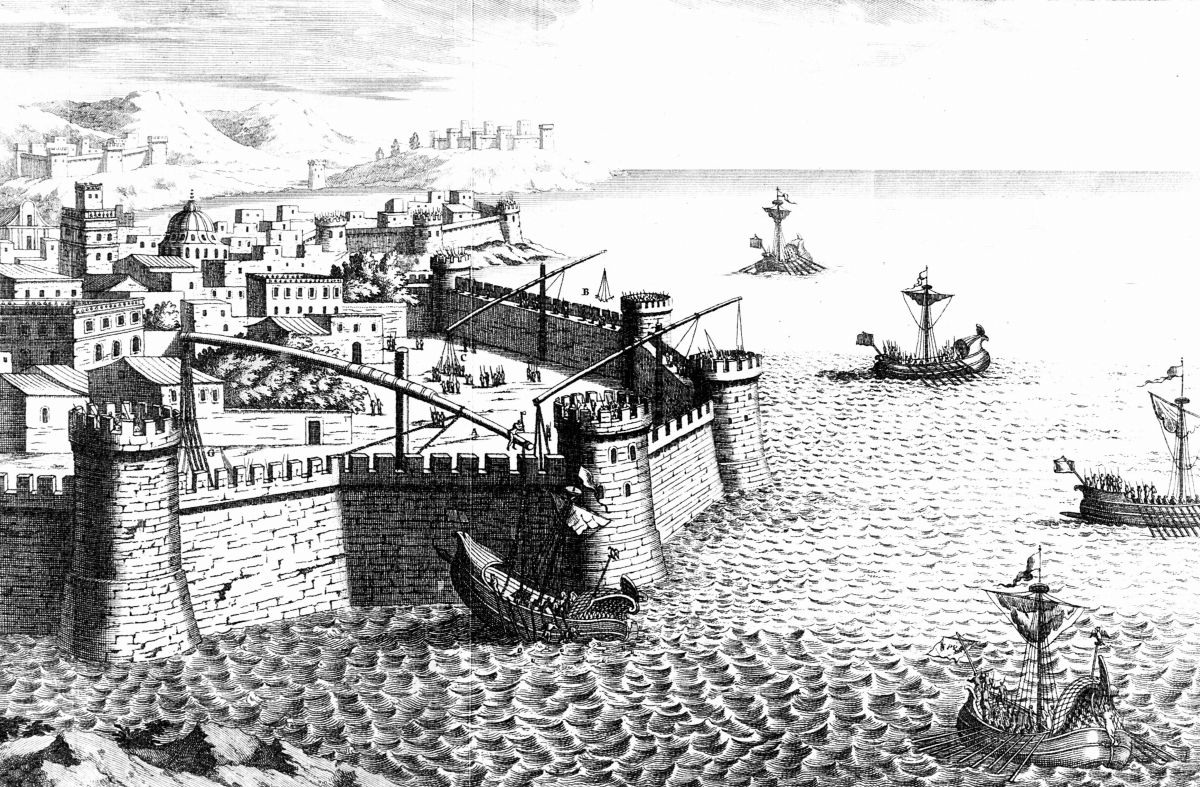The Second Punic War, fought between ancient Rome and Carthage, is most well-known for the clashes of the legendary Hannibal with Roman commanders. An often-overlooked engagement during this war is the Siege of Syracuse, from 213-212 BC, which tested strategic military might against feats of engineering. This contest pitted Marcus Claudius Marcellus, a Roman general renowned for his power in single combat, against the Greek mathematical genius Archimedes.
Although it took place in ancient times, the Siege of Syracuse arguably foreshadowed many problems presented in modern warfare. It was essentially a battle of technology–with opposing forces each initially associating victory with the successful use of it. Yet the battle also proved that advanced technology, lacking a superior strategy, is doomed to fail. It is also interesting to note Marcellus’ changed approach when he realized enemy technology could not be matched by his own force—a recurring issue in the history of modern warfare.
Marcellus, The Sword of Rome
At the time of the battle, Syracuse, located on the coast of Sicily, was a large city torn by civil strife. Its dictator, Hieronymus, had recently been assassinated after pledging allegiance to the enemies of Rome. The inhabitants of the city were predominantly Greek and—unlike the Romans—were largely focused on arts and had little appreciation for warfare. The city’s location and geographic characteristics gave it great strategic value. However, by Roman estimation it would not be especially difficult to conquer due to the civic unrest. The Roman general assigned to capture the city was Marcellus.
The ancient biographer Plutarch in his Lives series describes Marcellus as “a man of war, of a sturdy body and a vigorous arm.” He adds that Marcellus was “naturally fond of war,” yet was also “modest” and “humane.” Marcellus was beloved by the men under his command and had great prowess as a swordsman.
“Marcellus was efficient and practiced in every kind of fighting, but in single combat he surpassed himself, never declining a challenge, and always killing his challengers,” according to Plutarch. One of Marcellus’s greatest triumphs in single combat was killing a Gallic king on the battlefield and confiscating his armor in an achievement known as the spolia opima.
Marcellus hoped to take Syracuse without undue bloodshed. However, his plans were foiled by the spread of misinformation in the city by enemy Greek commanders, who claimed he was a vengeful conqueror. Surrender was refused. Therefore Marcellus drew up Roman forces on land and sea to besiege the city.
ARchimedes The Math Genius
The Greeks, however, had a secret weapon which gave them confidence against the invaders—a man called Archimedes, whose brilliance in geometry and theory was matchless. The former King Hiero had been so impressed with Archimedes’ demonstration of a pulley system––dubbed siege engines––moving a heavily loaded ship that he had ordered him to design a stockpile of them. Archimedes allegedly disdained using his intellect to design weapons, viewing it as crude and only participating as a matter of duty.
To the Greeks of Syracuse, Archimedes was the answer to all major problems of the impending battle. Plutarch describes him during the siege as “the one soul moving and managing everything; for all other weapons lay idle, and his alone were then employed by the city both in offence and defense.”
Like many great minds, Archimedes was a distracted genius. According to Plutarch, he spent most of his life absorbed in developing his theories—to the point of forgetting to eat and neglecting his personal health and appearance. It is said that force was needed to drag Archimedes away from his studies and induce him to bathe and tidy up. His myopic focus on mathematics and abstracted thoughts later played a role in his demise.
By the time the Romans brought forth their land and sea forces to attack Syracuse, the city’s inhabitants had at the ready a stockpile of never before used siege engines designed over the years by Archimedes. The Romans were unprepared for the effectiveness of the groundbreaking technology hurled at them in combat.
Plutarch writes that the engines of Archimedes “shot against the land forces of the assailants all sorts of missiles and immense masses of stones, which came down with incredible din and speed” and “knocked down in heaps those who stood in their way, and threw their ranks into confusion.”
Some of the engines included massive beams shot out from over the city walls which sank ships in the ocean below, while other machines described as “iron claws” or “beaks like the beaks of cranes” threw Roman ships into the air and cast them in disarray back into the water or against cliffs, killing the crews.

“Frequently, too, a ship would be lifted out of the water into mid-air, whirled hither and thither as it hung there, a dreadful spectacle, until its crew had been thrown out and hurled in all directions, when it would fall empty upon the walls, or slip away from the clutch that had held it,” according to Plutarch.
Foiled By Inventions
For once in his military career, Marcellus was baffled. He attempted to deploy innovative siege ships, called sambuca, equipped with ramps in order to scale the walls, but these also proved unsuccessful. Afterwards he withdrew his forces and attempted to outwit Archimedes by sending infantry over the city walls in a stealth assault. Marcellus estimated that the enemy’s large engines would not be effective at close range.
Archimedes, however, was poised and ready—he had prepared a variety of projectile weapons with adjustable ranges and when the Romans tried to sneak over the walls, “huge stones came tumbling down upon them almost perpendicularly, and the wall shot out arrows at them from every point.”
The effect on the legionnaires was total demoralization, according to Plutarch. “The Romans seemed to be fighting against the gods, now that countless mischiefs were poured out upon them from an invisible source.”
Indeed the men of the mighty Roman army were so terrorized that “whenever they saw a bit of rope or a stick of timber projecting a little over the wall, ‘There it is,’ they cried, ‘Archimedes is training some engine upon us,’ and turned their backs and fled,” Plutarch wrote.
The determined Marcellus, however, left no opportunity to chance. By this time the siege had already lasted over a year. Taking advantage of a lull in action caused by negotiations, Marcellus reconnoitered a tower at the edge of the city that appeared poorly defended.
He decided to apply the principle of Schwerpunkt—concentration of force—to that tower and planned to strike when the Greeks were feeling comfortable and oblivious.
Death by Festival
Marcellus “seized his opportunity when the Syracusans were celebrating a festival in honor of Artemis and were given over to wine and sport, and…not only got possession of the tower, but also filled the wall round about with armed men, before the break of day, and cut his way through” the city, according to Plutarch.
Archimedes was not fated to survive the sack of Syracuse. Plutarch and other ancient sources hold that the mathematician remained, as ever, typically distracted even as the Romans plundered the city. He was said to have been blissfully lost in his equations when he encountered a Roman soldier. Accounts differ as to what actually happened during the encounter. What is known is that the soldier killed Archimedes on the spot.

Despite the considerable trouble that Archimedes had put the Romans through, Marcellus mourned the death of his rival. It seems Marcellus had developed soldierly respect for the eccentric genius by the siege’s end. The Roman commander was “afflicted at his death, and turned away from his slayer as from a polluted person, and sought out the kindred of Archimedes and paid them honor.”
In the end, the war machines of Archimedes did not save the city of Syracuse from carelessness. Although they possessed superior technology than their enemies, the Greeks lack of a cohesive strategy and great military leadership—and their overreliance on the genius of Archimedes—led to their downfall. Although the Romans were technologically inferior, their commander’s resourcefulness and above all, his will to achieve victory, led him to complete his objective.





